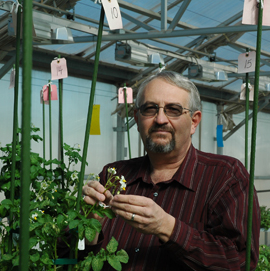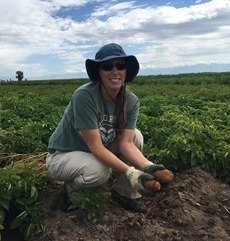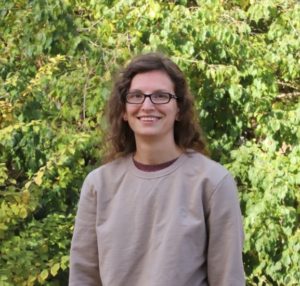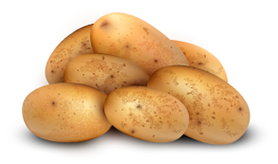About Us
About Us Home
History of the Program
The first full-time researcher was stationed at the San Luis Valley Research Center in 1956. Mr. James Twomey conducted a potato selection program based on seedling tubers from other programs around the US, primarily the USDA in Beltsville, MD and Prosser, WA. In 1979, under the leadership of David Holm, the Colorado State University Potato Breeding and Selection Program was initiated. As the program evolved, the number of first year seedlings planted for selection grew from approximately 40,000 to 90,000-100,000. Centennial Russet was named in 1976. This was the first cultivar released by Jim Twomey during what may be referred to as the modern area of the Program. Since that time, another 27 cultivars/clonal selections have been released including russets, reds, specialties, and chippers. Another 19 cultivars have been cooperatively released with various universities, the USDA-ARS, and Agriculture and Agri-Food Canada. Dr. David Holm retired in July 2021. In the Spring of 2022, Dr. Jessica Chitwood-Brown was hired as the new potato breeder and program leader for the CSU Potato Breeding and Selection Program. Dr. Chitwood-Brown is based on main campus in Fort Collins and makes frequent trips to the San Luis Valley to direct the program and work with the potato industry.
Personnel

Dr. Jessica Chitwood-Brown
Dr. Jessica Chitwood-Brown is from Alma, Arkansas where she grew up riding horses, competing in rodeos and horse shows, and helping with her family’s small farm. She received a B.S. in biology from the University of Arkansas at Fort Smith in 2012 and a M.S. in Horticulture with an emphasis in plant breeding from the University of Arkansas (2016) where she worked in spinach and cowpea breeding. Dr. Chitwood-Brown then received a Ph.D. in Horticulture from the University of Florida (2020) working in tomato breeding and genetics where her research focused on the use of complementing conventional plant breeding with molecular breeding tools to improve disease resistance. Jessica will carry this concept forward into the CSU potato breeding program where she will implement the use of molecular breeding tools to facilitate the development of improved potato varieties that meet the needs of growers. In her spare time, Jessica enjoys knitting, playing with her two dogs, and spending time outdoors with her family.

Dr. David G. Holm
David G. Holm was born in Southeast Idaho and raised on a family farm near Shelley in Bingham County. Potatoes, grain, and alfalfa were the primary crops raised. He credits his Dad and Grandfather with instilling in him an interest in potatoes, and his 7th grade science teacher with helping him decide on a career in science when he challenged the class to start thinking about the future and what they wanted to do for a living. Dr. Holm received his B.S. (1972) and M.S. (1974) from the University of Idaho and his Ph.D. from the University of Minnesota (1977). Dave began his professional career and is currently a Professor in the Department of Horticulture at Colorado State University located at the San Luis Valley Research Center, where he served as Superintendent from 1983–1997. Dave’s principal research responsibilities include the breeding and selection of new potato cultivars through traditional hybridization methods. Development of seed stocks of advanced selections for grower evaluation and seed increase is also an integral part of his program. He maintains close interaction with various research, extension, and production segments of the potato industry in Colorado and other major potato production areas of the US. He considers these relationships critical to the release and successful adoption of new cultivars. During Dave’s tenure, 22 cultivars have been released. He has cooperated with other universities, the USDA-ARS, and Agriculture & Agri-Food Canada in the release of another 19 cultivars. He also has developed five clonal selections of Sangre and Russet Norkotah.

Caroline Gray
Caroline is originally from Virginia Beach, VA. She received her B.S. (1998) and M.S. (2001) from Virginia Tech. She worked as a Research Associate for the Soybean Breeding Programs at Virginia Tech (2001-2004) and at the University of Arkansas (2004-2010). She is currently the Assistant Program Lead for the Potato Breeding and Selection at Colorado State University located at the San Luis Valley Research Center.

Beth Niebaum
Beth is originally from Blair, NE. She received her B.S. (2015) in Plant Biology specializing in Biotechnology and M.S. (2021) in Agronomy with a Statistics minor from the University of Nebraska-Lincoln. During her time at UNL she worked with the Turfgrass Program, specifically for the Buffalograss Breeding Program. Beth is a Research Associate working for the Potato Breeding and Selection at Colorado State University located at the San Luis Valley Research Center.
Vincent Lopez
Vincent Lopez is a Colorado native and a Colorado State University Alumni where he earned his B.S. degree in Horticulture. Vincent has had an extensive horticulture career in the private sector, and continues his career at Colorado State University. At the San Luis Valley Research Center, he assists in the breeding plan operations in both greenhouse and field settings. Vincent enjoys hiking, climbing, and camping in his free time and is a prospective Graduate student at CSU.
We offer paid summer internships for high school and college students. Complete the Contact Us form on the left to request an application.
Current Graduate Students
Greg Hess. Understanding Resistance to Necrotic Viruses in CSU Potato Germplasm with Genetic Markers and Virus Detection by MALDI-MS Biotyping Read more
Former Graduate Students
Katie Larson. Color, Carotenoid Content and Sensory Perceptions in Potato Germplasm from the Colorado Potato Breeding and Selection Program Read more
Sara Kammlade. The Influence of Agromanagement on Soil Health and Potato Mineral Nutrients Read more
Raven Bough. Screening Potato Germplasm for Flavor Utilizing HS-SPME/GC-MS and Sensory Panel Analyses Read more
Katrina Zavislan. Using Participatory Plant Breeding Strategies to Obtain Gardener Feedback in a Potato Breeding Program Read more
Jeremy Logrono. Jeremy’s project was focused on screening carotenoids in potato germplasm using the new technology of Rapid Evaporative Ionization Mass Spectrometry (REIMS)/iknife and using the HPLC analytical method. Evaluating the potential of REIMS/iknife to screen carotenoids may improve the efficiency and precision of selecting high carotenoid potato lines. He also studied the biological functions of the role of high carotenoids in potatoes to the human health.
Impacts
Colorado State University released 28 potato cultivars, including five clonal selections, and cooperated with other agencies in the release of another 19 potato cultivars. Another four selections have been disclosed and will be named soon.
Colorado cultivars and clonal selections accounted for 36% of the 7,858 acres of Colorado certified seed accepted for certification in 2018. Advanced Colorado selections accounted for another 2% of the seed acreage.
Colorado State University releases accounted for 37% of the estimated 51,900 acres planted to fall potatoes in Colorado in 2017. Primary Colorado cultivars planted were Canela Russet (10.4%), Russet Norkotah-S8 (10.4%), Russet Norkotah-S3 (7.5%), Centennial Russet (4.3%), and Rio Grande Russet (4.2%).
Four of the top 20 russet cultivars grown for seed in the U.S. [Silverton Russet (#7), Canela Russet (#11), Centennial Russet (#12), Rio Grande Russet (#18)] in 2018 were developed by the Colorado program. Twenty-nine percent of the Russet Norkotah acreage (including line selections) was attributed to Colorado Russet Norkotah Selections 3 and 8. For reds, Sangre and Colorado Rose ranked #7 and #11, respectively. For chippers, Chipeta ranked #10. For colored-fleshed specialties, Purple Majesty and Mountain Rose ranked #1 and #2, respectively.
Collaborative Research
The Colorado Potato Breeding and Selection Program relies on the invaluable cooperation of several growers, shippers, research and extension personnel to assess the production, adaptability, marketability, and other characteristics of advanced selections.
https://www.morningagclips.com/researchers-develop-nutrient-rich-potato/?utm_content=articles&utm_campaign=NLCampaign&utm_source=Newsletter&utm_term=newsletteredition&utm_medium=email”>Read more
Collaborators and areas of collaboration are:
- Mohamad Chikh-Ali – Disease Screening and Evaluation
- Samuel Essah – Cultivar Specific Production Management
- Adam Heuberger – Proteomics and Metabolomics
- Amy Charkowski – Plant Pathology
- Sastry Jayanty – Cultivar Specific Postharvest Management and Physiology (including nutritional characteristics and health attributes)
- Andrew Houser – Potato Certification Service
- Vamsi Nalam – Agricultural Biology
- Colorado Potato Growers
- Colorado Potato Administrative Committee
- Colorado Certified Potato Growers’ Association
- Southwest Regional Potato Breeding and Cultivar Development Cooperators (Colorado, Texas, and California). The overall objective of this research group is to develop and evaluate improved potato cultivars to meet the production, marketing, and producer/consumer needs of the Southwest U.S. Southwestern Regional Potato Variety Trial Reports
- Western Regional Potato Breeding and Cultivar Development Cooperators (California, Colorado, Idaho, Oregon, Texas, and Washington). The overall objective of this research group is to develop and evaluate improved potato cultivars to meet the production, marketing, and producer/consumer needs of the Western U.S. Western Regional Potato Breeding and Cultivar Development Cooperators
- Other cooperating research/extension programs – several cooperators throughout the United States and Canada provide breeding material and opportunities to screen our germplasm under various growing conditions and disease pressures not usually available in Colorado.
Acknowledgments
We would like to express appreciation to the following individuals, groups, and organizations for their efforts on behalf of the Colorado Potato Breeding and Selection Program.
1. Financial and In-kind Support from the following is gratefully acknowledged:
-
- Colorado Potato Industry – Area II and III
- Colorado State University – Colorado Agricultural Experiment Station & the Department of Horticulture and Landscape Architecture
- USDA – National Institute of Food and Agriculture – Potato Research Award Number 2021-34141-35449
- Potatoes USA – National Chip Processing Trial and National Fry Processing Trial
- Stone’s Farm Supply – in-kind support
2. Colorado Potato Administration Committee, Area II – Research Committee (Members and At-large Members)
and Area III
3. Technical Support/Graduate Students*
Thank you for all your hard work!
4. Research Collaborators – Colorado State University
| Andrew Houser | Samuel Essah | Sastry Jayanty | Mohamad Chikh-Ali |
| Amy Charkowski | Adam Heuberger | Michelle Foster | Vamsi Nalam |
5. Staff – San Luis Valley Research Center
| Jeff Davidson | Ron Price | |||
| Michelle Leckler | Sharon Yust | Craig Bressman |
6. Potato Certification Service
| Andrew Houser | Rick Haslar (retired) | Jeff Shawcroft | Sarah Hensley | Teresa Almeida |
7. Tissue Culture Laboratory
| Carolyn Keller |

